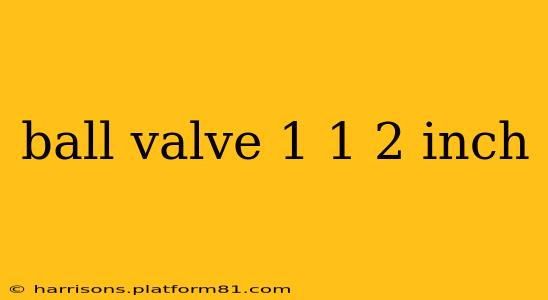Finding the right ball valve for your needs can feel overwhelming, especially when dealing with specific sizes like a 1 1/2-inch ball valve. This comprehensive guide will delve into the specifics of 1 1/2-inch ball valves, covering their applications, types, materials, and more. We'll address common questions surrounding these valves to ensure you make an informed decision.
What is a 1 1/2 Inch Ball Valve Used For?
A 1 1/2-inch ball valve, like other ball valves, is a quarter-turn valve used to control the flow of liquids or gases. Its compact design and simple operation make it incredibly versatile. The 1 1/2-inch size is frequently utilized in various applications, including:
- Plumbing: Controlling water flow in residential, commercial, and industrial settings. This could include anything from controlling water to appliances to managing larger water lines in a building.
- Industrial Processes: Regulating the flow of fluids in manufacturing plants, chemical processing facilities, and other industrial environments. The size might be suitable for various pipelines handling materials like oils, chemicals, or gases.
- Irrigation Systems: Managing water flow in agricultural settings. This allows for precise control over water distribution in various sections of a field or garden.
- HVAC Systems: Controlling refrigerant flow in air conditioning and refrigeration systems. This ensures efficient and safe operation of these critical systems.
What are the Different Types of 1 1/2 Inch Ball Valves?
1 1/2-inch ball valves come in various types, each offering unique features and benefits:
- Full-Port Ball Valves: These offer unrestricted flow, minimizing pressure loss. They're ideal where maximum flow capacity is crucial.
- Reduced-Port Ball Valves: These have a smaller internal diameter, resulting in slightly restricted flow. They're often more compact and less expensive than full-port valves.
- Three-Way Ball Valves: These allow for diverting flow to two different outlets or mixing flows from two sources.
- Floating Ball Valves: The ball is not rigidly held in place, resulting in easier operation.
- Trunnion Ball Valves: The ball is supported by trunnions (shafts), making them better suited for higher pressures and larger sizes.
What Materials are 1 1/2 Inch Ball Valves Made From?
The material of a 1 1/2-inch ball valve significantly influences its durability, corrosion resistance, and suitability for specific applications. Common materials include:
- Brass: Offers good corrosion resistance and is suitable for many plumbing applications.
- Stainless Steel: Highly durable and corrosion-resistant, ideal for industrial and demanding environments. Different grades (like 304 or 316) offer varying levels of corrosion resistance.
- PVC (Polyvinyl Chloride): A lightweight and cost-effective option, suitable for less demanding applications. However, it has limitations on temperature and pressure.
- CPVC (Chlorinated Polyvinyl Chloride): A more robust version of PVC, capable of withstanding higher temperatures.
What is the Difference Between a 1 1/2-Inch and a 1 1/4-Inch Ball Valve?
The key difference lies in their diameter: a 1 1/2-inch ball valve has a larger internal diameter than a 1 1/4-inch valve. This translates to a higher flow capacity. Choosing the correct size is crucial to ensure adequate flow rate for your application and avoid pressure drops.
How Do I Choose the Right 1 1/2 Inch Ball Valve?
Selecting the correct 1 1/2-inch ball valve depends on several factors:
- Fluid type: The valve material must be compatible with the fluid being handled.
- Pressure rating: The valve must be rated for the operating pressure of the system.
- Temperature rating: The valve must be able to withstand the operating temperature.
- Flow rate requirements: This determines whether a full-port or reduced-port valve is more appropriate.
- End connections: These need to be compatible with the piping system (e.g., threaded, flanged, etc.).
Where Can I Buy a 1 1/2 Inch Ball Valve?
1 1/2-inch ball valves are widely available from various suppliers, including plumbing supply stores, industrial suppliers, and online retailers. Be sure to compare prices and specifications before making a purchase. Remember to verify the valve's specifications match your application's demands for pressure, temperature, and fluid compatibility.
This comprehensive guide provides a foundation for understanding 1 1/2-inch ball valves. Remember that proper selection and installation are crucial for ensuring safe and efficient operation. If you're uncertain about which valve to choose for your specific needs, consulting with a plumbing professional or an engineer is always recommended.
